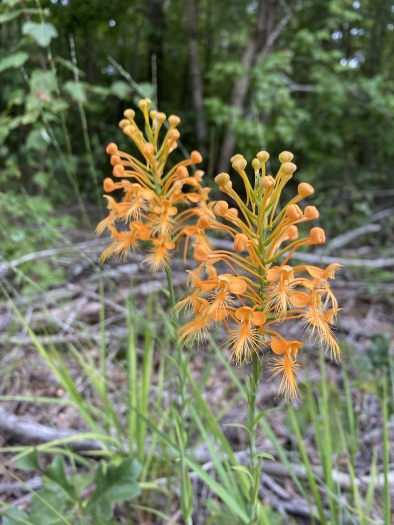Yellow Fringed Orchid
(Platanthera ciliaris)
Yellow Fringed Orchid (Platanthera ciliaris)
/
/

Dylan Shaw
CC BY 4.0
Image By:
Dylan Shaw
Recorded By:
Copyright:
CC BY 4.0
Copyright Notice:
Photo by: Dylan Shaw | License Type: CC BY 4.0 | License URL: http://creativecommons.org/licenses/by/4.0/ | Rights Holder: Dylan Shaw | Publisher: iNaturalist | Date Created: 2023-07-20T20:19:40Z |













Estimated Native Range
Summary
Platanthera ciliaris, commonly known as the Yellow Fringed Orchid, is a perennial herbaceous plant and a showy orchid species native to a variety of habitats including pine savannas, flatwoods, seepage bogs, and moist meadows in the eastern United States, from Texas to the Atlantic coast and north to the Great Lakes region. It is particularly adapted to open, sunny environments and is dependent on recurring fire to maintain such conditions. This orchid typically grows to a height of 1 to 3 feet (30-90 cm) and features a striking raceme of bright yellow flowers with fringed lips, blooming from July to September. The flowers are highly attractive to pollinators, especially swallowtail butterflies.
The Yellow Fringed Orchid is valued for its ornamental beauty and its ability to attract pollinators. It is often used in native plant gardens, restoration projects, and naturalized areas. In cultivation, it requires acidic, well-drained soils and consistent moisture, mimicking its natural boggy habitat. It thrives in full sun to part shade. While it is a stunning addition to gardens, it is not commonly found in the nursery trade due to its specialized growing requirements and conservation status. Gardeners interested in this species should seek out reputable sources that do not contribute to the depletion of wild populations. The primary conservation concern for Platanthera ciliaris is habitat loss, particularly the destruction of wetlands and the suppression of natural fire regimes that help maintain its open habitat. It is endangered in Michigan and considered at risk in several other states.CC BY-SA 4.0
The Yellow Fringed Orchid is valued for its ornamental beauty and its ability to attract pollinators. It is often used in native plant gardens, restoration projects, and naturalized areas. In cultivation, it requires acidic, well-drained soils and consistent moisture, mimicking its natural boggy habitat. It thrives in full sun to part shade. While it is a stunning addition to gardens, it is not commonly found in the nursery trade due to its specialized growing requirements and conservation status. Gardeners interested in this species should seek out reputable sources that do not contribute to the depletion of wild populations. The primary conservation concern for Platanthera ciliaris is habitat loss, particularly the destruction of wetlands and the suppression of natural fire regimes that help maintain its open habitat. It is endangered in Michigan and considered at risk in several other states.CC BY-SA 4.0
Plant Description
- Plant Type: Herb
- Height: 1-3 feet
- Width: 1-2 feet
- Growth Rate: Rapid
- Flower Color: Orange, Yellow
- Flowering Season: Summer, Fall
- Leaf Retention: Semi-deciduous
Growth Requirements
- Sun: Full Sun, Part Shade
- Water: High
- Drainage: Medium
Common Uses
Bee Garden, Butterfly Garden, Water Garden
Natural Habitat
Native to pine savannas, flatwoods, seepage bogs, and moist meadows in the eastern United States
Other Names
Common Names: Yellow Fringed Bog Orchid, Orange Fringed Orchid
Scientific Names: , Platanthera ciliaris, Blephariglotis ciliaris, Blephariglottis ciliaris, Blephariglottis flaviflora, Habenaria ciliaris, Habenaria ciliaris var. alba, Orchis ciliaris,
GBIF Accepted Name: